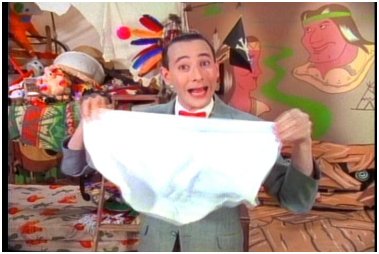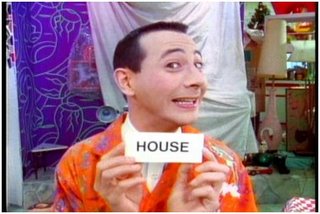 Paul Reubens turned the box office success of Pee Wee's Big Adventure into a CBS Saturday morning show the following year. I remember it well, as it clearly stuck out from the plethora of cartoons that marked the network programming of the day, and was one of the few shows to this day that prominently featured giant underpants. My mom, like most parents of the time, looked at Pee Wee Herman the way that adults would look at Tom Green in the late 1990's, or the way I look at people today who repeatedly watch "Deal or No Deal." That is, one just assumes that the subject in question is on drugs. I would imagine that many parents at that time shared my mom's suspicions, As it turned out, Pee Wee's Playhouse turned out to be the most creative educational programming I would ever watch.
Paul Reubens turned the box office success of Pee Wee's Big Adventure into a CBS Saturday morning show the following year. I remember it well, as it clearly stuck out from the plethora of cartoons that marked the network programming of the day, and was one of the few shows to this day that prominently featured giant underpants. My mom, like most parents of the time, looked at Pee Wee Herman the way that adults would look at Tom Green in the late 1990's, or the way I look at people today who repeatedly watch "Deal or No Deal." That is, one just assumes that the subject in question is on drugs. I would imagine that many parents at that time shared my mom's suspicions, As it turned out, Pee Wee's Playhouse turned out to be the most creative educational programming I would ever watch.Like most kids in America, the only educational TV that had made an impact on me up until 1986 was Sesame Street. But the Playhouse was an entirely different animal. In Sesame Street, the kids took a back seat to the adults in terms of on-screen representation. I knew all of the adult's names, but the kids were faceless interchangeable parts, only there to laugh at the puppets and ask questions so that the adults felt important. In the Playhouse, Pee Wee and his kid friends (a crew which included a pre-coked up Natasha Lyonne) were equals. There were no blatant labels like "adult" and "child"; just a group of friends creating their own fun without judgment or authority over each other. The "secret word" unified everyone, and it instantly caught on and was re-created within classrooms throughout the country as a subversive yet ultimately harmless way for kids to keep authority figures in check.
 On Sesame Street, Oscar the Grouch was an asshole to everyone, and in return the 'responsible' adults on the show called him names and forced him to live a trash can, rather than ever offer him a place to stay. In the Playhouse, Randy the evil puppet is not just humored by Pee Wee, but more often than not is there to teach a lesson, such as when Randy convinced Pee Wee to make prank phone calls - a bad idea that resulted in dangerous repercussions (probably because Pee Wee couldn't be bothered to think of a new joke from the one Randy just told!) Randy is a dick with bad ideas, and kids learned about consequences from his actions. What did I ever learn from Oscar the Grouch? I learned that homeless people are angry pricks, and they'll only bring you down. That's about it.
On Sesame Street, Oscar the Grouch was an asshole to everyone, and in return the 'responsible' adults on the show called him names and forced him to live a trash can, rather than ever offer him a place to stay. In the Playhouse, Randy the evil puppet is not just humored by Pee Wee, but more often than not is there to teach a lesson, such as when Randy convinced Pee Wee to make prank phone calls - a bad idea that resulted in dangerous repercussions (probably because Pee Wee couldn't be bothered to think of a new joke from the one Randy just told!) Randy is a dick with bad ideas, and kids learned about consequences from his actions. What did I ever learn from Oscar the Grouch? I learned that homeless people are angry pricks, and they'll only bring you down. That's about it.For all the dizzying colors, loud noises and special effects, the show knew when to lay it on thick and when subtlety was key. Lessons against prejudices were never made verbal, but 3 of Pee Wee's favorite visitors were black. I was never jealous of the futuristic toys that Pee Wee had, because his absolute favorite toy was just a giant ball of foil - something I could make in my very own kitchen! I'm sure that copycat collections of this valuable possession sprung up all over the country during this time frame, much to the delight of the good folks at Reynolds Wrap. As for the more 'in your face' lessons, I'm quite confident that my lifelong hatred/fear of door-to-door salesmen was formed from teachings like this one. What's with the giant heads on those guys?
Boundaries did not exist within a Playhouse where clocks, globes, and chairs had fully developed personalities. There was absolutely nothing that Pee Wee couldn't do in the house, and by association, kids watching believed the same was true for them. Sesame Street set itself to educate children. Pee Wee did the same, but with the added bonus of constantly encouraging creativity. In watching the episodes from their triumphant return on the Cartoon Network, the message still holds up, as do the double entendres that harmlessly went over my head as a child. And yet the writing neither talks down to the audience of 8-year-olds, nor talks below the audience of 28-year-olds. That lesson of "anything is possible" was never carried out as well as it was within the confines of the Playhouse. It's a lesson that I still apply to my job and life today. Granted, I get weird looks when I scream and jump anytime somebody says the secret word, but it's only a matter of time before that catches on again.






1 comment:
My three and a half year-old daughter has the entire collection on DVD, including the christmas special - a true classic. We watch the shows together and both laugh while my wife shakes her head at us. Some of the best television EVER.
Post a Comment